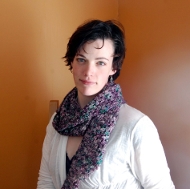
“So what’s your passion?”
“What do you see yourself doing in five years?”
“What are your career goals?”
However you choose to phrase it, college students are continuously asking themselves and being asked, “What do you want to do when you grow up?” This is a complicated and multi-faceted question to consider—at any age, and any stage in your professional career. To answer this requires a great deal of introspection and knowledge of the world around us. It requires knowledge of your skills and passions, and an understanding of where those paths connect with a vocation. To answer this question is asking a lot of someone whose immediate goals are not living off Ramen and passing the calc final.
I was honored recently to find myself in front of a class of Geography students at Worcester State University in the hearth of the Commonwealth. The class is called “Sustainable Communities” and I was there to share about the NEROC program. Naturally, I opened by asking the students what came to mind when they thought of trailers/ mobiles/ manufactured homes. The answers are what you might imagine:
Small
Low-income
Tornado
I then asked the class what words they associated with “house” and again, the answers were what you might imagine:
Family
Mortgage
Money
We discussed that in the US there are more than 50,000 manufactured housing communities wherein 98% of the homeowners rent the land under their homes. There are families who own their home, investing up and above $180K, yet rent the land underneath. We discussed why this is an insecure situation. In these communities, people do have mortgages. They often are low-income. The mortgages available for manufactured homes (which are not considered real estate in Massachusetts) frequently have interest rates above the market average. And if the land goes up for sale, the future becomes very uncertain. The students asked fantastic questions, like what people do if the land was going to change use:
1- The family can move and leave the home behind, losing that investment
2- The family can try to move the home. We discussed cost ($12k or more) and difficulty (finding a lot to accommodate the home, potential damage in moving the home).
And if the land changes hands?
1- The family can stay and manage the potential lot rent increase as best they can.
2- The community members can opt to try and buy the property, and turn it into a resident-owned community.
We then talked about the process of a community of neighbors forming a cooperative association and buying the land under their homes. This begins the long future of resident-ownership. What makes this a sustainable community? On the personal scale, these homes are small, efficient and part of a community. For older Americans, they offer a close-knit living environment and single-level living. In resident-owned communities, people are stewards of the environment, taking pains to ensure minimum water and electricity usage. There are a number of community gardens being cultivated for food security. And low-income people are taking control of their circumstances (and lot rent!). We discussed the roll-out of this movement of resident-ownership across the country and I was asked about my day-to-day tasks and challenges.
The students were engaged and attentive. In the course of our time together, I mentioned that I had begun my foray into cooperatives as a student at Worcester State not so many years ago. And while I was there spreading the word about what good work CDI and the NEROC program are doing, I was also hoping to plant some seeds.
In short order, these students are going to be looking for internships, and graduating and looking for work. These students are in a course on “Sustainable Communities” because there is a germ of interest for them therein. It is incumbent upon those of us in the cooperative economy to inform our young and emerging cooperators and colleagues of what is out there, what kind of work can unite with their passions. And in the end, if the seeds take root, awesome.
-Maureen Carroll
